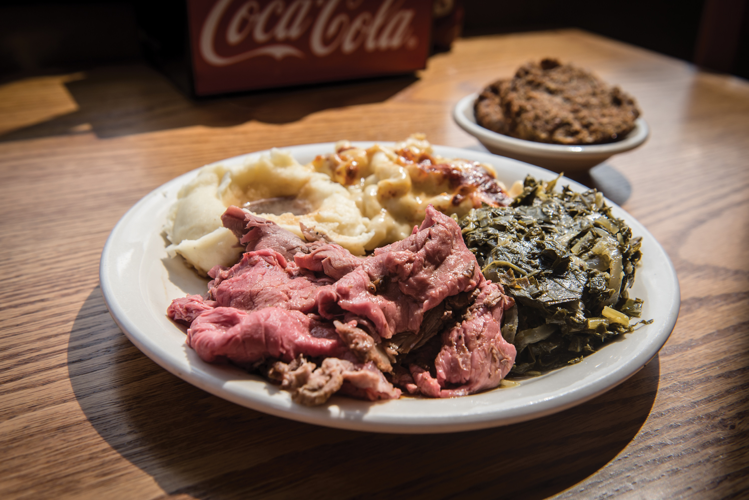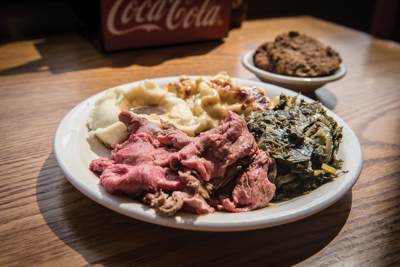
Skipp Bibb at the Elliston Place Soda Shop
When I heard a few weeks ago about the closing of The Pie Wagon, a Nashville meat-and-three and institution since 1922, I worried that more people weren’t worried about it.
I mean, not only is it one of our oldest restaurants, it’s a meat-and-three — one of our city’s most important culinary claims to fame. It’s a place where we’ve set a welcome table for all, and it’s linked with our music history. The Division Street restaurant’s proximity to and popularity with music industry folk earned it the nickname “Music Row Commissary.”
The Pie Wagon’s demise brought to mind other meat-and-threes that have closed, like the Sylvan Park Restaurant in 2015. It was there that I used to meet with late, great journalist and food author John Egerton, the man who taught me — and so many of us — to pay attention to the meat-and-three cafeteria line as a great equalizer, a place where Porter Wagoner stood next to a postman, who stood next to a nurse.
Then I remembered 2011, when the Elliston Place Soda Shop nearly closed over a lease issue, and how we took to the streets for what we thought would be our last plate of fried chicken there, the place Jimmy Buffett thanked in the liner notes of three of his records. We, as a city, helped raise a little hell until a deal was reached to keep the restaurant open.
So considering all of this — and considering the fact that more than 100 new restaurants are opening in Nashville each year — I kind of wanted to shout at a passing pedal tavern, Do you even know what a meat-and-three is? But after remembering my manners and realizing the “woo girls” wouldn’t be able to hear me over their singing anyway, it occurred to me that it’s not the tourists I’m worried about. It’s the locals. I personally hadn’t darkened the doors of The Pie Wagon in years, so who am I to be worried now? And that has me wondering: Are we even a meat-and-three town anymore?
Of course, the newest newcomers may not even have heard of the meat-and-three, a traditional Southern cafe serving up home-style cooking, where customers peruse the daily menu and select one meat option and two or three (or more) side dishes to round out the plate.

From left: Mon, Rose and Kahlil Arnold
I made a beeline for our beloved Arnold’s Country Kitchen, perhaps the most high-profile meat-and-three in Nashville, with a James Beard medal hanging on the wall. At lunch on a Tuesday, I found co-owner Kahlil Arnold shaking hands and hugging the ladies and giving the cross-restaurant point to regulars to ask if they wanted dessert. Rose, Kahlil’s mom, was giving hugs too, with a phone receiver pressed to her ear (a producer for a national television show was on the line). A woman in front of me in the queue turned and asked: “Will you hold my place? I always have to say something to the police.” She gestured toward a table of five cops having lunch.
If Nashville is in danger of losing its meat-and-threes — or its hospitality amid the growth — it sure wasn’t showing at Arnold’s.
“I recognize just about everybody in that line,” Kahlil Arnold said of the people waiting for his roast beef and his peach pie. “We’re a place based on locals. I love knowing everybody’s name. Those people are our bread-and-butter.”
I’ve been thinking a lot about hospitality lately, after snooty service at a certain hip local restaurant. But meat-and-threes like Arnold’s teach us how to be. I think Nashville has a reputation as a friendly city because so many of us came here from somewhere else and remember the hospitality shown to us as new arrivals. We want to pass that spirit along, and meat-and-threes remind us of that and give us a place to feel rooted and at home.
Speaking of roots, Arnold proudly told me while I was at his restaurant that he had procured Hap Townes’ famous recipe for stewed raisins, and that he’d soon add them to the menu. He wants to pay homage to Hap Townes, both the man and the restaurant that shared his name, which operated as a food cart and meat-and-three from 1921 until 1985.
Townes had a conversation with Egerton in 2006 for the Southern Foodways Alliance (an institute that promotes the study of Southern food culture) in which he recalled how his customers lamented the loss of meat-and-threes more than three decades ago. “A lot of my customers said, ‘Hap, I hope you don’t never close this place,’ ” said Townes. “They said, ‘It’s only about four or five decent meat-and-threes left in Nashville. They’re all going out of business.’ It’s such a job to cook and get all this stuff ready, I told them.”
Maybe meat-and-threes are like good country records — we sometimes worry about them going away, even as good ones come along or persist. Meat-and-threes are full of music-business stories, after all. Chet Atkins had a favorite table at Hap Townes’ place, and Shel Silverstein would call and beg Townes to stay open late. Jack Arnold, Kahlil’s father, said he once convinced Z.Z. Top to play an impromptu show at the restaurant. (“Do y’all even know how to use those things,” he reportedly taunted them, pointing at their instruments.) Music writer Chet Flippo used to say that record contracts in Nashville came with a gravy stain, because deals would go down at the meat-and-three rather than in the boardroom. Arnold still sees this happen today, as a passing of the torch among elders in the music business brings in the new folks.
The day after lunch at Arnold’s, I drove to the Silver Sands Cafe, which has been serving neighbors near the Nashville Farmers’ Market and Jefferson Street for more than 50 years. At 1 p.m. on a Wednesday, owner Sophia Vaughn had a line about 10 people deep for her fried chicken and mac-and-cheese. Even with condos springing up around a the corner with “now leasing” flags flying, she told me it’s still her regulars — not the newer folks, necessarily — keeping her going.

Derrick Bailey at Bailey & Cato
While Vaughn is staying put, others have moved and reopened. After getting priced out of East Nashville’s Riverside Village, Derrick Bailey relocated his family operation, Bailey & Cato, to a Madison strip mall near Planet Fitness. When I visited, the line for oxtails and hot-water cornbread stretched halfway through the room.
Newer places that operate like meat-and-threes but by a different name have arrived as well, like the counter at the grocery in Plaza Mariachi, with its plate lunches of carnitas with beans and plantains. When famed chef Maneet Chauhan opened Chauhan Ale & Masala House in Nashville in 2014, she paid homage with an Indian-style meat-and-three meal.
I’ve always liked John T. Edge’s theory about why Nashville loves its meat-and-threes, found in his book Southern Belly. Because of the music business, he posited, we’re a country-come-to-town kind of city with a love for country cooking. But as Edge notes in the book, Egerton kindly shot the theory down. Besides, maybe we’re not so much a country-come-to-town place anymore. Regardless, I do think we’re still a meat-and-three town, even if we don’t exactly know why.
There’s obviously a lot of history behind Nashville’s meat-and-threes, but there’s something more than just that. It’s kind of like how a show just sounds better at the Ryman. Sure, to some degree, it’s the acoustics of the room. But there’s something more spiritual to it than that. It’s a mystery baked into the soul of this place.
Pondering all this, Kahlil Arnold quoted Egerton.
“This is the kind of thing you just thank your lucky stars for,” he said. “The kind of blessing you chalk up to unearned grace.”
Regardless, and even as we say goodbye to The Pie Wagon, I do think we’re still a meat-and-three town.









